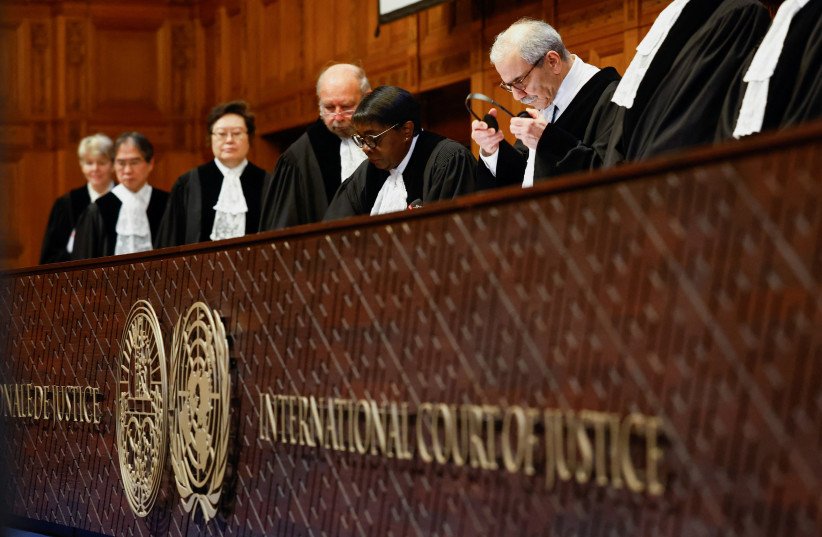The International Court of Justice in The Hague published on Friday its advisory opinion regarding the legality and legal consequences of Israel’s ongoing occupation of the Gaza Strip, the West Bank, and east Jerusalem.
This advisory opinion will undoubtedly be discussed extensively, and it is challenging to predict its practical weight accurately. However, it is crucial to understand it and not dismiss it as irrelevant.
At the outset, it should be noted that, unlike the proceedings between South Africa and Israel based on the Convention on the Prevention and Punishment of the Crime of Genocide, to which Israel is a party and which is thus binding on Israel, the advisory opinion deals with questions of legal interpretation at the request of the UN General Assembly rather than a dispute between two states, and therefore it is not binding. This does not mean the advisory opinion can or should be ignored, as it may have significant implications for Israel.
In the main opinion, the court judges explicitly addressed several fundamental issues, such as the illegality of the settlement enterprise, Gaza being under continuous Israeli occupation despite the withdrawal and disengagement in 2005, the illegality of the annexation of east Jerusalem, the de facto annexation of Area C in the West Bank, and the violation of the Palestinian people’s right to self-determination, as well as discriminatory treatment by Israeli authorities acting as the occupying power in the Palestinian territories.
The court’s advisory opinion calls, among other things, for Israel to immediately halt the settlement enterprise and cease illegal activities in the territories. It also calls on the international community, including states and the UN, to work toward ending the occupation. The opinion suggests (but avoids explicitly stating) that the discrimination in the treatment of Israeli citizens (settlers) and Palestinians in the territories could amount to apartheid or unlawful segregation. The advisory opinion also determines that Israel must compensate all those harmed.

However, a more in-depth examination of the opinion reveals both the legal issues underpinning it and the “political escape routes” the judges included.
For example, the court refrained from explicitly declaring the occupation itself illegal, addressing in its decision the illegal activities Israel conducts as an occupying power contrary to international humanitarian law, particularly the Fourth Geneva Convention of 1949.
Comments by the dissenting judges
The opinion, as noted by some dissenting judges, addresses neither Israel’s security needs, which led to the occupation’s commencement during the 1967 Six Day War, nor the Palestinian terrorism threat Israel has had to confront over the years. Some dissenting judges also pointed out that the main opinion did not adequately address the existence of a political and diplomatic process, backed by Security Council resolutions, intended to lead to a two-state solution. They acknowledged that the current political reality sees this process as stalled, but still found it appropriate to recognize its principled existence.
IN THE coming days, we will likely hear immediate reactions to the decision – in Israel and worldwide. Most of these reactions will be predictable and automatic. Most Israeli politicians will regard the decision as disgraceful and even antisemitic, while in the international community, we will especially hear voices calling for Israel’s immediate withdrawal from all Palestinian territories, including east Jerusalem. However, similar to the court’s advisory opinion, the reality is more complex than hollow slogans and immediate responses.
To calm international community tensions, Israel will need to find the right path that balances essential security needs with better adherence to the rights of the Palestinian population. After the hostilities in Gaza will decrease and all hostages are returned, a way must be found to resume negotiations for an actual solution. Failure to do so could worsen Israel’s already fragile standing in the international community and increase international pressure for economic and security sanctions against Israel.
The final question to address is how this decision will affect other international tribunal proceedings Israel faces: the case between South Africa and Israel before the International Court of Justice (ICJ), and the investigation conducted by the prosecutor of the International Criminal Court (ICC) in The Hague, in which the prosecutor has requested the ICC to issue international arrest warrants against the prime minister and the defense minister.
In my opinion, the legal caution exercised by the ICJ on the most critical issues – such as avoiding the declaration that the occupation itself is illegal and avoiding a clear declaration of apartheid, and the variety of opinions of the judges who chose to add their statements or dissenting opinions to the main opinion – will make it difficult to derive a clear interpretation that allows this advisory opinion to be used decisively in other proceedings.
The decision was made at the request of the UN General Assembly, so the next step lies before them. The issue will likely be brought before the UN Security Council, where Israel enjoys the protection of the American veto. It is difficult to predict what developments will occur beyond that, but it can be said with certainty: it will not be easy.
The writer is director of research (terrorism, belligerency, and cyber) at the Minerva Center for the Rule of Law under Extreme Conditions at the University of Haifa; and chairman of ALMA – the Association for the Promotion of International Humanitarian Law.
